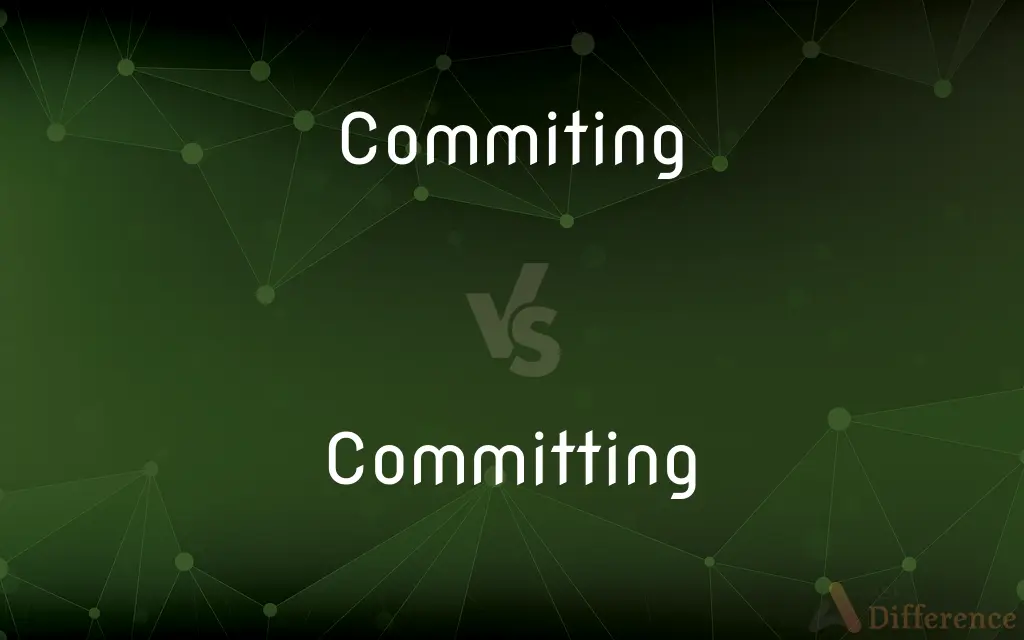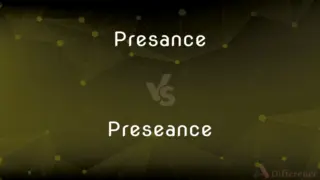Commiting vs. Committing — Which is Correct Spelling?
By Tayyaba Rehman — Updated on March 25, 2024
"Commiting" is incorrect. The correct spelling is "Committing," referring to the act of pledging or engaging oneself.

Table of Contents
Which is correct: Commiting or Committing
How to spell Committing?

Commiting
Incorrect Spelling

Committing
Correct Spelling
ADVERTISEMENT
Key Differences
One "commitment" leads to another – both have two "m"s and two "t"s.
"Commit" already has two “m”s, so double the “t” when adding "ing."
Think of "MITT" as in a baseball mitt – double “t.”
For verbs ending in a consonant-vowel-consonant pattern, double the final consonant before adding "-ing" if the final syllable is stressed.
Recall double “m” in "Commitment" and double “t” in "Committing."
ADVERTISEMENT
How Do You Spell Committing Correctly?
Incorrect: She regretted commiting to such a demanding job.
Correct: She regretted committing to such a demanding job.
Incorrect: They discussed the importance of commiting resources wisely.
Correct: They discussed the importance of committing resources wisely.
Incorrect: By commiting to regular practice, you'll improve.
Correct: By committing to regular practice, you'll improve.
Incorrect: He was accused of commiting a serious crime.
Correct: He was accused of committing a serious crime.
Incorrect: Are you sure you're ready for commiting to this project?
Correct: Are you sure you're ready for committing to this project?
Committing Definitions
Engaging oneself in a specific activity or cause.
She's committing to daily exercise.
Pledging or promising.
He's committing to the project.
Engaging or occupying oneself.
Committing to his studies helped him achieve.
Carrying out or performing a specific action, often negative.
He was found guilty of committing fraud.
Entrusting something or someone.
Committing the documents to his care was a mistake.
To do, perform, or perpetrate
Commit a murder.
To put in trust or charge; entrust
Commit oneself to the care of a doctor.
Commit responsibilities to an assistant.
To consign for future use or for preservation
We must commit the necessary funds for the project.
To place officially in confinement or custody, as in a mental health facility.
To put into a place to be disposed of or kept safe
Committed the manuscript to the flames.
To make known the views of (oneself) on an issue
I never commit myself on such issues.
To bind, obligate, or devote, as by a pledge
They were committed to follow orders. She committed herself to her art.
To refer (a legislative bill, for example) to a committee.
To pledge, obligate, or devote one's own self
Felt that he was too young to commit fully to marriage.
Present participle of commit
The act by which something is committed.
Committing Meaning in a Sentence
Before committing to the plan, they evaluated all the risks.
Committing time to your hobbies is important for a balanced life.
Committing to daily exercise can significantly improve your health.
Committing to learning a new language takes dedication.
By committing themselves to sustainability, the company gained positive attention.
He was nervous about committing to such a long lease.
He feared committing to the wrong choice, so he hesitated.
They avoided committing to a timeline until they had more information.
The treaty involved committing to peace and cooperation.
She's considering committing to a year of travel.
Committing resources to research and development is crucial for innovation.
After committing to the project, she felt a sense of responsibility.
Committing to a pet means taking on a long-term responsibility.
The athlete talked about committing to a rigorous training schedule.
They recommend committing at least 10% of your income to savings.
By committing to regular meetings, the team stayed on track.
Before committing, make sure you understand the contract.
She had trouble committing to any decision without second-guessing.
Committing to a healthier diet was her New Year's resolution.
Committing to volunteer work enriched his life.
They were celebrated for committing their lives to humanitarian work.
Committing to a minimalist lifestyle helped them save money.
He apologized for not committing more time to the project.
After committing to the course, he bought all the required books.
She emphasized the importance of committing to professional development.
Committing Idioms & Phrases
Committing to paper
Writing down thoughts, ideas, or plans.
He found that committing his goals to paper helped him achieve them.
Committing to the bit
Continuing with an action or joke even in the face of adversity or lack of success.
He was really committing to the bit, even though no one laughed at first.
Committing oneself to the task
Dedicating oneself fully to completing a specific job or task.
Once she committed herself to the task, there was no stopping her until it was done.
Committing to the cause
Fully supporting a movement, idea, or goal with actions and dedication.
They spent years committing to the cause of environmental conservation.
Committing to the deep end
Taking on a challenging or difficult situation with full effort.
He was committing to the deep end by taking advanced courses in his first year.
Committing to memory
Memorizing something thoroughly.
She spent hours committing the formulas to memory for the exam.
Committing heart and soul
Putting all of one's energy and passion into an endeavor.
She was committing heart and soul to the charity event.
Committing to the path
Deciding on a course of action and sticking to it despite challenges.
After much deliberation, he was finally committing to the path of medical school.
Common Curiosities
What is the root word of Committing?
"Commit."
What is the pronunciation of Committing?
/kəˈmɪtɪŋ/.
Which vowel is used before Committing?
Depends on context. Example: "a committing relationship."
Which preposition is used with Committing?
"To," as in "committing to a task."
Which conjunction is used with Committing?
Any conjunction can be used, depending on the context.
Is Committing a noun or adjective?
It's primarily a verb form, but can be used as a noun in some contexts.
Is Committing an adverb?
No.
Why is it called Committing?
It derives from the verb "commit," indicating the act of doing or pledging.
What is the verb form of Committing?
"Commit."
Is Committing an abstract noun?
No, but the concept can be abstract in some contexts.
What is the plural form of Committing?
Not applicable.
Is Committing a negative or positive word?
Neutral, though the context can influence its connotation.
What part of speech is Committing?
Verb (gerund form).
What is the third form of Committing?
Committed.
What is the singular form of Committing?
"Committing" itself. (It's a verb form, so singular/plural doesn't apply).
Is Committing a vowel or consonant?
"Committing" is a word, not a letter.
What is a stressed syllable in Committing?
"Mit."
Which determiner is used with Committing?
Depends on context, but can include "this," "that," etc.
Is Committing a collective noun?
No.
Is the word Committing imperative?
No, but "Commit!" is imperative.
What is the opposite of Committing?
Abandoning or retracting.
What is the first form of Committing?
Commit.
Is Committing a countable noun?
Not typically used as a noun, but when it is, it's not countable.
What is the second form of Committing?
Committed.
How is Committing used in a sentence?
"She is committing herself to the cause wholeheartedly."
Which article is used with Committing?
Either "a" or "the" based on context.
Is the Committing term a metaphor?
No.
How many syllables are in Committing?
Three syllables.
How do we divide Committing into syllables?
Com-mit-ting.
What is another term for Committing?
Pledging.
Share Your Discovery

Previous Comparison
Presance vs. Preseance
Next Comparison
Ledgend vs. LegendAuthor Spotlight
Written by
Tayyaba RehmanTayyaba Rehman is a distinguished writer, currently serving as a primary contributor to askdifference.com. As a researcher in semantics and etymology, Tayyaba's passion for the complexity of languages and their distinctions has found a perfect home on the platform. Tayyaba delves into the intricacies of language, distinguishing between commonly confused words and phrases, thereby providing clarity for readers worldwide.













































